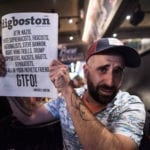
What if, after Harvey Weinstein was outed as the extraordinary sleaze that he is, virtually everyone in Greater Boston acted as if sexual harassment was a terrible but foreign concept, posing a threat to those who roam the Hollywood Hills but sparing those on Beacon Hill. Imagine if the newspapers refused to purge the snakes in our own backyard and if potential local perpetrators were considered heroes despite evidence from elsewhere that suggested otherwise.
I know that I don’t just speak for myself when I say that is how it feels watching from Massachusetts every time that issues around police violence and abuse surface in national headlines. From the spotlight on hostilities in Ferguson, Missouri, to Baltimore, Maryland, to the actions of Black Lives Matter and innumerable offshoots of that movement, there has been ample (not always well-informed, but ample nonetheless) attention on these topics for about three years now; but as Hub crusaders who fight for police accountability will tell you, even when the talking heads on CNN and MSNBC are calling for an end to the demoralizing treatment and harassment of people of color and poor folks of all stripes at the hands of the fuzz, all that most Bostonians with platforms can say is that cops in these parts are some kind of an exception. It’s more predictable than the political persuasion of a guy with truck nuts on his pickup.
Because this is a big city that operates like Mayberry in many ways, people tend to pat cops on the back a lot. Even in—hell, especially in—the immediate wake of events like the ones that unfolded in Boston over these past couple of weeks, following the taping of a disrespectful white cop, one Zachary Crossen, by a black man who was being vilified for no clear reason. Since that video went viral and hit the national news cycle, it seems like people in these parts fall into two camps—the largely white No shit? side, which refuses to believe such officers are anything but outliers, and the largely black and brown No shit side, without the question mark, that has experienced racial profiling or worse more times than they can possibly recall during their time in Boston.
It isn’t possible for both sides to be right. Those who holler about stop and frisk and other crass oppressive cop behavior are talking about actual events—backed up by BPD data, and brought to the public attention’s thanks to legal action by the ACLU of Massachusetts—and just because you may not see such things unfold where you live doesn’t mean these things don’t happen. As a journalist who has spent years covering communities where even kids are often tossed on top of cruisers for no reason whatsoever, I’ve seen up close and heard about this problem on countless occasions. It’s not some random gripe that comes out only when a video of police acting badly makes the rounds. It’s something everyone from activists to residents who simply want to walk around unbothered deal with every day.
Of course not all cops are bad. But the fact that people feel like they have to begin all condemnations of corrupt police with that preamble is a testament to just how many rotten law enforcement officers there are, and to the way that many of them take out their aggression on those who point out the obvious, all evidence of their atrocities be damned. As for the good cops, it’s during trying times like these that we must really wonder who they are and when they plan on standing up. Officer Crossen, who made a jackass of himself in the aforementioned video, has reportedly been involved in the past with an initiative in which the BPD gives ice cream out to young people in black and brown communities. It may be way more comforting to think about police handing out Hoodsie cups than it is to think about them taunting innocent pedestrians, but to focus on the superficial fluff and ignore hideous realities is to pretend that our city’s immune to this eternal universal plague, and it impedes the opportunity to make real changes to the system moving forward.
A Queens, NY native who came to New England in 2004 to earn his MA in journalism at Boston University, Chris Faraone is the editor and co-publisher of DigBoston and a co-founder of the Boston Institute for Nonprofit Journalism. He has published several books including 99 Nights with the 99 Percent, and has written liner notes for hip-hop gods including Cypress Hill, Pete Rock, Nas, and various members of the Wu-Tang Clan.

